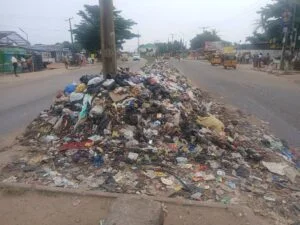Lagos residents have decried the increasingly irregular services by the Private Sector Participant (PSP) waste operators in the state, leading to indiscriminate littering of refuse in the state.
The residents have warned that the situation is heightening environmental and public health risks.
They disclosed this in separate interviews with the News Agency of Nigeria (NAN) on Sunday in Lagos.
NAN reports that parts of Ikorodu, Ayobo, Alagbado, Shasha, Ikotun, Akesan, Afariogun Street, Mafoluku , Airport Road and LASU-Iba road, among others showed that long gaps in waste evacuation have pushed many households to burn refuse or dump it in gutters, especially during rainfall.
In Ikorodu, Miss Adekoya Toyosi, a businesswoman, said the PSP operators no longer maintain predictable schedules.
Toyosi disclosed that collection sometimes drops from three times a month to once a month.
“If the waste is much and the PSP doesn’t come around, we make use of the gutter when it’s raining, and sometimes we burn it when it’s sunny,” she said,
She added that residents pay between ₦500 and ₦700 depending on the volume of waste.
Mr Timilehin Ogunnariwo, also an Ikorodu resident and a human resource practitioner, said the PSP trucks often arrive already filled, leaving inner streets unattended.
“I use three drums in my compound, but when waste accumulates, big rats scatter it everywhere,” he said.
He added that leakage from an overflowing PSP truck in the local market had become a recurring environmental hazard.
Also, Mrs Ajibola Mafolayanmi, a fashion designer, said she burns her waste three to four times a week.
“There is a field where people dispose their waste, but it’s far. Burning gives us catarrh and cough, but we have no choice since the PSP does not come to our area,” she said.
Mrs Ogundinmu Mariam, who oversees market waste in Ikorodu, said refuse is evacuated weekly through the local council but not consistently.
“During the rainy season the whole place becomes messy and smells.
“Some residents have turned to informal haulers,” she said.
Mrs Oluranti Favour, a food vendor, said cart pushers are now her main option, adding that the PSP operators “come once in a while.”
Another resident, Iya Gbogo, said she pays between ₦500 and ₦1,000 weekly for private disposal because she is not registered under the PSP.
In the Ayobo extension, residents attributed the gaps in service delivery to bad roads and persistent rainfall.
Mrs Gloria Ogbu said operators resurfaced “only after a very long while.”
At Shasha, Egbeda, a teacher, Mrs Stella Lawrence, said the PSP operators render “selective services,” noting that nearby estates enjoy regular pickups while other streets are neglected.
“They should make waste evacuation regular and affordable. Many people now rely on the banned cart pushers,” she said.
Along the AIT Road, Alagbado, NAN observed heaps of refuse on the road median, attributed to weeks of non-collection.
In Ikotun, Mr Ugochukwu Eze, a journalist, criticised the billing system by the PSP operators.
“Sometimes, they don’t come for two weeks, yet they bill you as if they came. They behave like the former NEPA that bills you whether service is rendered or not,” he said.
Eze called for a pay-as-you-go model to avoid shortchanging of residents.
In the Akesan–Badore axis along LASU–Isheri Road, Mr Kunle Ayodele, a civil servant, said PSP operators had not visited in more than three weeks.
“The heaps of dirt pose the risk of a disease outbreak. PSP comes only twice a month, so people now dump refuse on the expressway,” he said.
He added that the closure of the Igando dumpsite and relocation to Badagry had increased turnaround time and diesel costs for operators, affecting frequency of evacuation.
Also, Mr Ugochukwu Okoro, a civil servant and a resident of Ajao Estate, said PSP operators have reduced the frequency of waste collection in the estate in spite of regular payments.
“I don’t understand what is happening. PSP operators that used to come every Wednesday are no longer coming despite our regular payments.
“Ajao Estate that is known for its cleanliness is gradually being littered with wastes,” Okoro said.
However, in Lekki Phase 1, residents reported consistent service.
Mrs Ese Afolabi, a civil servant, commended PSP operators, saying they evacuate waste every Monday or the next day if there is a delay.
“As long as we pay, they come. They have been consistent, and it keeps the environment clean and healthy,” she said.
The President of the Association of Scrap and Waste Pickers of Lagos, Mr Friday Oku, acknowledged concerns about scavengers scattering waste at collection points.
Oku said the association is collaborating with government agencies to train waste pickers on proper handling and occupational safety.
“Some of them are not under our association and avoid training because they fear taxation. We are planning more community awareness and training next year,” he said.
Commenting on the broader challenges, Dr Olugbenga Adebola, President of the Association of Waste Managers of Nigeria, said PSP operators remain committed to effective service delivery but face structural constraints.
“The PSP operators are committed to efficient service delivery. However, as some of your respondents noted, there are challenges at the disposal sites which we, together with the government, are discussing at the highest level.
“We recently met with the governor, and discussions were productive. Short-, medium- and long-term solutions are being worked on to address the disposal problems,” he said.
NAN reports that residents across the affected communities urged the Lagos State Government and the Lagos Waste Management Authority to ensure more frequent and predictable PSP services to curb indiscriminate dumping, burning and related health hazards.


